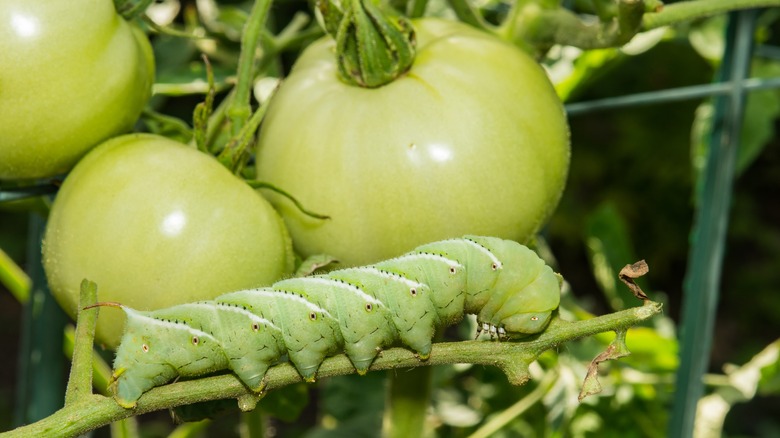The Beautiful Plant That'll Keep Hornworms From Destroying Your Tomatoes
Fighting off tomato hornworms can seem like an endless task, especially if the population gets out of control rather quickly. Picking them off one by one is the easiest way to get rid of hornworms. Still, it's time-consuming, and if you think they're icky, you won't want to do it to start with. Luckily, you can plant sweet alyssum flowers in your garden to attract plenty of pest-fighting critters that will help keep the hornworm population down to a minimum.
Letting nature do its thing is good for the local ecosystem and saves you some work, so let sweet alyssum attract some pest control to your garden. The plant also has some other benefits you might like -– it's pretty, adds a peppery punch to your food, and is self-sowing. So, it will stick around for years to come by replanting itself each year if you allow it to go to seed.
Use sweet alyssum to attract hornworm predators
Sweet alyssum will attract many pollinators, but there are three that will help with your hornworm problems: ladybugs, lacewings, and parasitic wasps. Specifically, ladybugs and lacewings' young contribute to hornworm-killing efforts by eating the eggs and small larvae, killing off the population long before they become a problem. These predators also go after aphids and other pests while pollinating your garden, so they're good insects to keep around. As for the latter species, wasps sound like bad news, but the parasitic ones are allies in the garden. They don't attack people and swarm around nests. Instead, they lay eggs on caterpillars like hornworms, and when they hatch, the larvae feast on their carrier. Gross, right? This helps keep the population down and supplies your garden with more wasps to keep life cycles turning.
Sweet alyssum gets along with many plants in the garden. Most importantly, it grows well next to tomato plants, so parasitic wasps will have no problem finding those hornworms. In warm climates, the flowers bloom all year long and provide invaluable pest control and pollen throughout the winter months.
